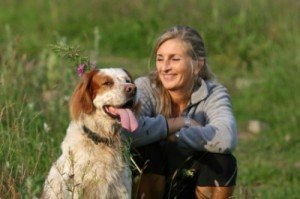There are a few things that you can keep an eye out for to will help to ensure that your pet dog or cat also enjoys the holiday season without a major health issue arising.
Snakebite is a major concern for pet owners, particularly during the spring and summer months, and this year is no exception with a bumper season for snakes expected due to the extremely wet weather in many of the states.
Dogs are particularly susceptible to snakebite because of their inquisitive nature. It’s important to remember that if you’re travelling away to rural and regional parts of Australia this summer, walking your dog in the bush or in tall grass makes them far more likely to come across a snake.
If possible dog owners should try to avoid snake prone areas, particularly if they are walking their dog off the leash at the end of the day.
It’s important for pet owners to be aware of the signs of snakebite as you may not actually see your dog being bitten.
Signs to watch out for include seizures, vomiting, bleeding around the bite, weakness in the limbs and inability to move. Soon after this the animal will often collapse with severely laboured breathing.
Although snake bite can be deadly, rapid treatment with the appropriate anti-venom can be a very effective treatment if done quickly.
If you spot any of these symptoms in your pet, quickly call the nearest veterinarian so that they can be prepared for your arrival at the veterinary hospital with the right treatment.
Another problem that requires constant checking of pets is the issue of paralyses ticks. These little suckers are found right the way up and down the eastern seaboard of Australia, mainly in the coastal zone, which is also where many people head during the holiday season.
Both cats and dogs are susceptible, and once again we are expecting particularly severe tick season this year due to the wet weather.
Dog and cat owners are being encouraged to prevent serious harm or death by checking their pets regularly for the little suckers over the coming months.
Dogs playing in tall grass are particularly susceptible, with ticks often found around the head and neck, as well as on the chest and the front leg; however they can latch on to any part of your dog or cat.
If it has a tick, you’ll often see your dog staggering due to hind leg weakness from the tick toxins. A really sick animal will also gurgle and choke and will be unable to bark properly due to paralysis of the throat.
They may also start to cough when eating or drinking, or may cough up water or food. Some animals may also develop problems breathing. It is vital to take action immediately if you notice any of these signs.
Ideally in tick prone areas dog and cats you should be checking your pet daily. You can do this by running your fingers through the coat to feel for anything unusual. In cats they are often around the back of their neck where they cannot groom.
Sometimes more than one tick will be found, so don’t stop looking even if a tick has already been found.
Your veterinarian can give you further advice on tick prevention products and how to remove ticks. If there is any concern you should contact your local vet for advice, as even after removal of a tick there is usually progression of the signs over the next 24 hours.
This year veterinarians across Australia have also been treating unusually high numbers of winter cases of a deadly dog and puppy disease canine parvovirus or parvo.
Cases appear throughout the year but spike in the hotter months. Parvovirus is most severe in puppies – with death in around 80 per cent of untreated cases.
Common signs of the disease are severe vomiting and bloody diarrhoea.
The frustrating thing for vets is that this virus is highly preventable. Every single puppy or kitten in Australia needs to be vaccinated against deadly diseases. This much less expensive than treating your pet after it gets sick and saves the heartache of losing a new family member too soon.
It’s important to talk to your vet as soon as you get a new pet about vaccinations and other ways to ensure your puppy or kitten lives a long and healthy life.
Jacob O’Shaughnessy
The Australian Veterinary Association
Ph: 02 9431 5062

